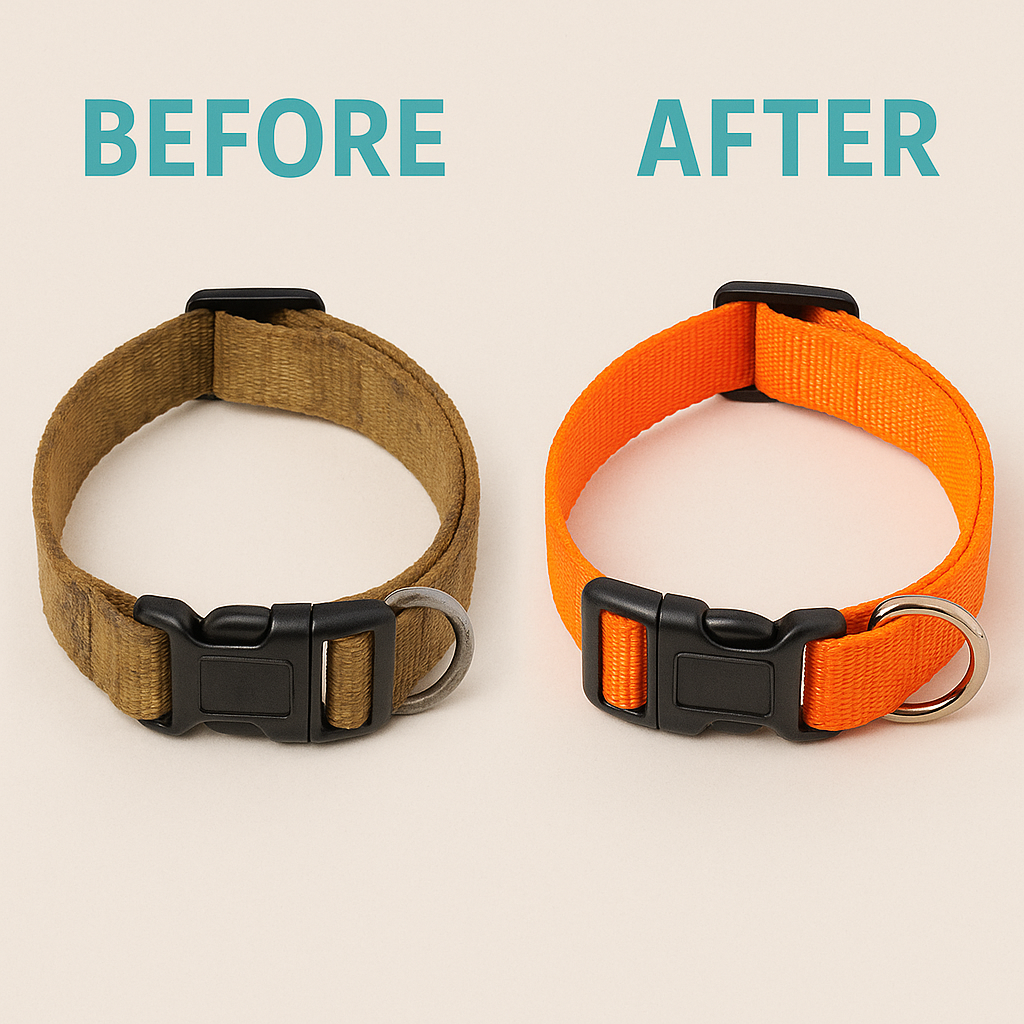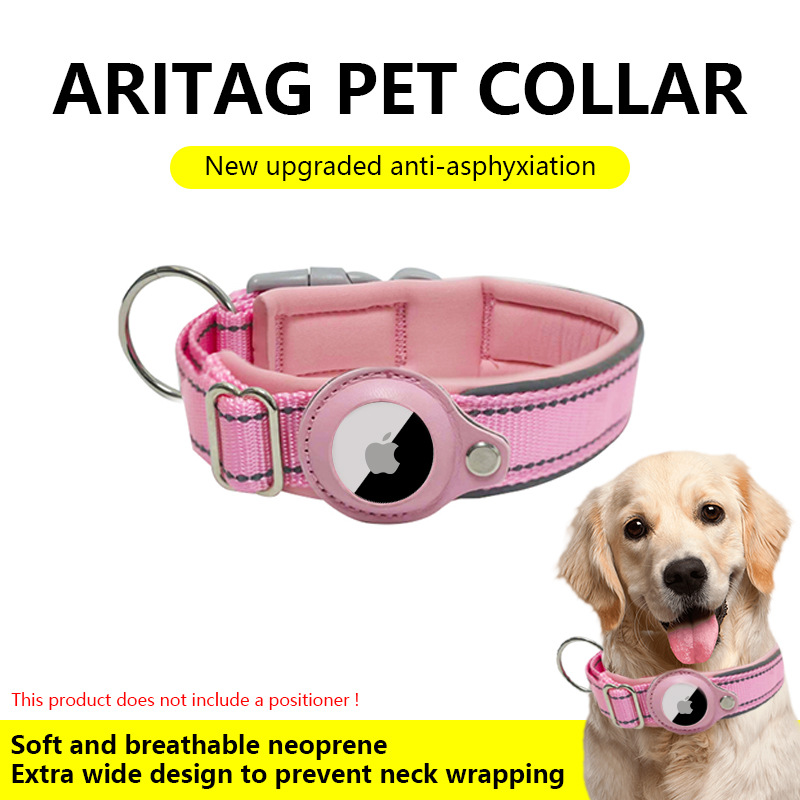Nylon Dog Collar Series – Part 3 of 3
Meta Description: Learn how to properly clean and maintain nylon dog collars, and explore bulk customization tips, manufacturing workflow, and legal compliance for pet retailers.
Covering search intent: “how to clean smelly nylon collar”, “can you machine wash dog collars”, “dog collar maintenance tips”
Dog collars—especially nylon ones—are exposed to sweat, dirt, and bacteria daily. If not cleaned properly, they can develop unpleasant odors, skin irritants, or even harbor harmful microbes. Regular care not only extends the product’s lifespan but also protects your dog’s health.
Step-by-Step Cleaning Guide:

1.Remove Dirt First – Brush off dried mud or hair.
2.Soak in Soapy Water – Use mild dog-safe soap and lukewarm water.
3.Scrub Gently – Use a soft brush or cloth.
4.Rinse Thoroughly – Remove all detergent residue.
5.Air Dry Completely – Hang the collar in a ventilated area. Avoid direct sunlight to preserve color.
Tip: For extra freshness, soak in a mix of water + baking soda for 15 minutes before rinsing.
Sanitizing Method | Bacteria Kill Rate | Effect on Nylon Fibers |
Boiling Water (1 min) | 99% | May weaken or warp fiber |
UV Light Sanitizer | 95% | No damage |
White Vinegar Soak | 80–90% | Safe, but may leave odor |
Even the strongest collars eventually face wear and tear. Instead of replacing them outright, you can extend their life with minor repairs:
Recommended Tools:
1.Webbing Punch – Create new adjustment holes if needed.
2.Nylon Thread Welder – For resealing frayed edges or broken stitching.
3.Plastic Buckle Replacements – Keep spares for quick swaps.
Pro tip: Offer a “care guide” with every collar you sell—it boosts customer trust and reduces returns.
Covering search intent: "bulk dog collars with logo", "custom nylon collar manufacturers", "private label dog collar supplier"
After ensuring proper care and maintenance of nylon collars, it’s time to dive into the business side: how are these collars made, and what does it really cost?
For retailers, distributors, or private label brands, understanding the production process and cost breakdown is essential to maintaining profit margins and quality control.
Here’s a sample breakdown of a mid-market collar sold at $15 retail:
Materials (nylon webbing + safety buckle): $2.80
Printing or Logo Branding (screen or heat transfer): $0.50/unit
Packaging (OPP bag + hang tag): $0.30–$0.50
Shipping (per unit, sea freight): $1.20
Adding custom logos or reflective stitching increases per unit cost by $0.20–$0.80 depending on quantity.
To maintain quality, top-tier suppliers (like Minardipets) follow a structured process:
Design Confirmation → Digital Mock up (3 days)
→ Pantone-Matched Dyeing → Nylon Webbing Cut
→ Logo Printing → Stitch Reinforcement
→ Ultrasonic Welding → Quality Inspection → Packing
Average production lead time: 15–25 days for MOQ orders. Faster delivery available with pre-dyed stock.
Covering search intent: “who invented nylon dog collars”, “smart dog collar features”, “future of pet collars”
Before jumping into expert opinions and compliance, let’s take a step back and look at how nylon collars have evolved over the decades—and what’s coming next.
1964 – DuPont introduces nylon dog collars, replacing stiff equestrian leather gear.
2012 – 3M reflective material becomes an industry safety standard.
2021+ – Widespread use of laser-cut webbing, BPA-free buckles, and eco-materials.
The demand for reflective dog collars grew by 280% between 2012–2024 (PetSafe Market Index).
6.2 What’s Next: Smart & Sustainable Collars

Tech and sustainability are reshaping the collar market:
Feature | Description | Keyword Match |
Heat Alerts | Temperature sensors detect overheating | smart dog collar heat sensor |
Tribo-electric Power | Converts movement into energy (powers GPS) | self-charging dog collar |
Recycled Nylon | ECONYL® & RPET demand rising | eco-friendly dog collar 2025 |
7. Pro User Insights: What Trainers & Owners Recommend
Covering search intent: “best dog collar for working dogs”, “do nylon collars last long?”
According to a 2024 survey of 217 dog owners:
→ 83% of nylon collars remain functional after 3 years of regular use.
→ 92% of users say they would re-purchase the same nylon collar brand.
Search intent: “dog collar safety standards”, “EU pet product compliance”, “is my pet product legal?”
Region | Requirement |
EU | Collars must withstand 5x dog's weight (tensile strength testing). |
Australia | Bans phthalates in plastic components. |
US | Recommends CPSIA, FDA-compliant materials for pet wearables. |
To protect your business from liability claims:
Secure at least $2M product liability coverage (e.g., through PetPro or Hiscox).
Ask your supplier for third-party testing reports and material declarations.
Final Thoughts + Action
A well-made nylon collar isn’t just a strap — it’s your dog's first layer of safety. From design and sizing to cleaning and sourcing, every step matters.
Ready to upgrade your collar lineup? Contact Minardipets for free samples, custom quotes, or expert product support.